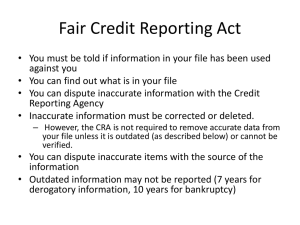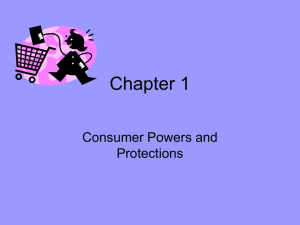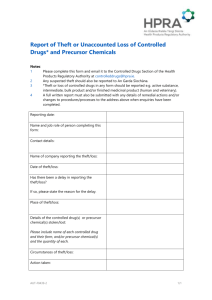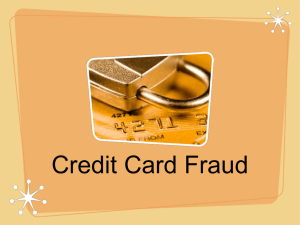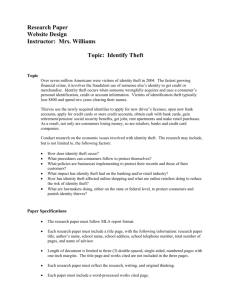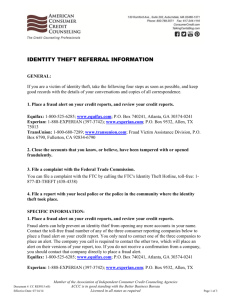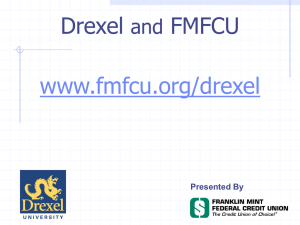Identity Theft Form - Park Ridge Municipality
advertisement
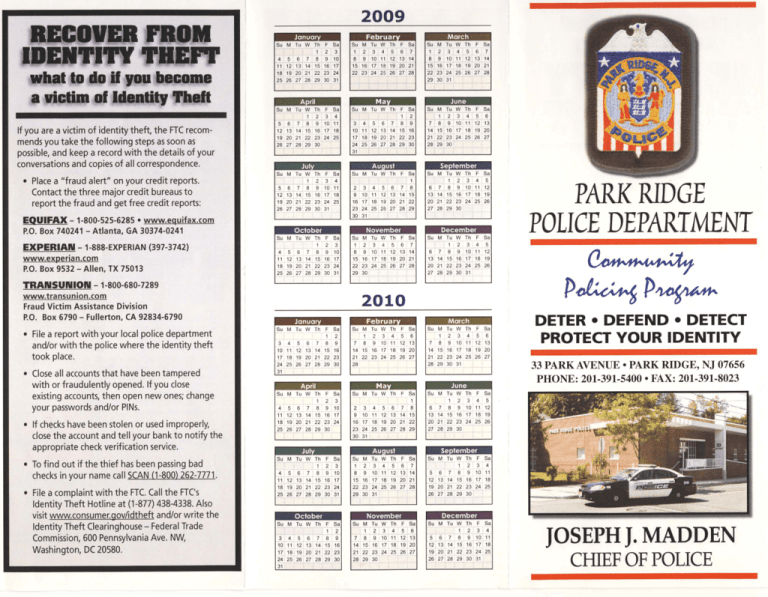
~ • • . llark 3Ribge llolice Ilepartment :morougo of l)ark ~ibge, .flebJ Jf ergep CHIEF OF POLICE PHONE: 201-391 -5400 FAX : 201-391-8023 WWW. PARKRIDGEPOLlCE .COM IDENTITY THEFT FACT SHEET Immediate steps to be taken by victim of identity theft and/or fraud: ./ Contact the customer service and/or security departments of the appropriate creditors and financial institutions of the accounts that have been accessed or opened and close the accounts. Change the passwords of all the new accounts that you open . ./ Contact the fraud departments of the three major credit bureaus and report the theft, request a "fraud alert" be placed on your filer that means no new credit will be granted without your approval and request a "free" copy of your credit report, as under federal law a victim of identity theft is entitled to a "free" copy of their report, so that you may scrutinize it for discrepancies. o EQUIFAX: 1-800-525-6285 o EXPERIAN: 1-800-397-3742 o TRANS UNION: 1-800-680-7289 ./ New Jersey has recently passed legislation creating the ability for consumers to put a "security freeze " on your credit file which makes it more difficult for credit being opened fraudulently if criminal element attempting to open the credit has your personal information i.e. name and social security number. To place a "freeze" on your credit report you need to write the three credit agencies which have specific procedures. Call the above credit agencies for details or go to the NJ Dept. of Banking and Insurance website www.state.nj.us to the "security freeze" link and for more details regarding Identity Theft Information and Prevention . ./ File a police report with your local police department or the police agency where the identity theft took place. Make sure to write down the report number or obtain a copy of the report in case the credit card company, bank or other creditors need proof of the crime later . ./ Contact the ID Theft Clearinghouse at 1-877-ID-THEFT to report the theft. This is run by the Federal Trade Commission to assist consumers and victims of identity theft and other fraud related complaints. Counselors will take your complaint and assist you with information on how to deal with credit related problems that may arise. The Identity Theft Hotline and ID Theft Website (www.consumer.govlidtheft) will assist consumers and victims with helpful information as well as provide a centralized place to report the crimes to the federal government. Although the Federal Trade Commission does not have the authority to bring criminal cases, it may refer victim complaints to the appropriate government agency and private organizations for further action. Para informacion en espanol, visite www.consumer.gov!idtheft 0 escribe Pennsylvania Avenue, N.W. Washington, D.C., 20580. a la FTC, Consumer Response Center, Room 130-B, 600 Remedying the Effects of Identity Theft You are receiving this information because you have notified a consumer reporting agency that you believe that you are a victim of identity theft. Identity theft occurs when someone uses your name, Social Security number, date of birth, or other identifying information, without authority, to commit fraud. For example, someone may have committed identity theft by using your personal information to open a credit card account or get a loan in your name. For more information, visit www.consumer.gov/idtheft or write to: FTC, Consumer Response Center, Room 130-B, 600 Pennsylvania Avenue, N.W. Washington, D.c., 20580. The Fair Credit Reporting Act (FCRA) gives you specific rights when you are, or believe that you are, the victim of identity theft. Here is a brief summary of the rights designed to help you recover from identity theft. 1. You have the right to ask that nationwide consumer reporting agencies place "fraud alerts" in your file to let potential creditors and others know that you may be a victim of identity theft. A fraud alert can make it more difficult for someone to get credit in your name because it tells creditors to follow certain procedures to protect you. It also may delay your ability to obtain credit. You may place a fraud alert in your file by calling just one of the three nationwide consumer reporting agenCies. As soon as that agency processes your fraud alert, it will notify the other two, which then also must place fraud alerts in your file. • Equifax: 1-800-525-6285; www.equifax.com • Experian: 1-888-397-3742; www .experian.com • TransUnion: 1-800-680-7289; www.transunion .com An initial fraud alert stays in your file for at least 90 days. An extended alert stays in your file for seven years. To place either of these alerts, a consumer reporting agency will require you to provide appropriate proof of your identity, which may include your Social Security number. If you ask for an extended alert, you will have to provide an identity theft report. An identity theft report includes a copy of a report you have filed with a federal, state, or local law enforcement agency, and additional information a consumer reporting agency may require you to submit. For more detailed information about the identity theft report, visit www.consumer.gov Ii dtheft. 2. You have the right to free copies of the information in your file (your "file disclosure"). An initial fraud alert entitles you to a copy of all the information in your file at each of the three nationwide agencies, and an extended alert entitles you to two free file disclosures in a 12-month period following the placing of the alert. These additional disclosures may help you detect signs of fraud, for example, whether fraudulent accounts have been opened in your name or whether someone has reported a change in your address. Once a year, you also have the right to a free copy of the information in your file at any consumer reporting agency, if you believe it has inaccurate information due to fraud, such as identity theft. You also have the ability to obtain additional free file disclosures under other provisions of the FCRA. See www.ftc.gov/credit. 3. You have the right to obtain documents relating to fraudulent transactions made or accounts opened using your personal information. A creditor or other business must give you copies of applications and other business records relating to transactions and accounts that resulted from the theft of your identity, if you ask for them in writing. A business may ask you for proof of your identity, a police report, and an affidavit before giving you the documents. It also may specify an address for you to send your request. Under certain circumstances, a business can refuse to provide you with these documents. See www.consumer.gov/idtheft. 4. You have the right to obtain information from a debt collector. If you ask, a debt collector must provide you with certain information about the debt you believe was incurred in your name by an identity thief - like the name of the creditor and the amount of the debt. 5. If you believe information in your file results from identity theft, you have the right to ask that a consumer reporting agency block that information from your file. An identity thief may run u~ bills ill your name and not pay them. Information about the unpaid bills may appear on your consumer report. Should you decide to ask a consumer reporting agency to block the reporting of this information, you must identify the information to block, and provide the consumer reporting agency with proof of your identity and a copy of your identity theft report. The consumer reporting agency can refuse or cancel your request for a block if, for example, you don't provide the necessary documentation, or where the block results from an error or a material misrepresentation of fact made by you. If the agency declines or rescinds the block, it must notify you. Once a debt resulting from identity theft has been blocked, a person or business with notice of the block may not sell, transfer, or place the debt for collection. 6. You also may prevent businesses from reporting information about you to consumer reporting agencies if you believe the information is a result of identity theft. To do so, you must send your request to the address specified by the business that reports the information to the consumer reporting agency. The bUSiness will expect you to identify what information you do not want reported and to provide an identity theft report. To learn more about identity theft and how to deal with its consequences, visit www.consumer.gov/idtheft, or write to the FTC. You may have additional rights under state law. For more information, contact your local consumer protection agency or your state attorney general. In addition to the new rights and procedures to help consumers deal with the effects of identity theft, the FCRA has many other important consumer protections. They are described in more detail at www.ftc.gov/credit.
